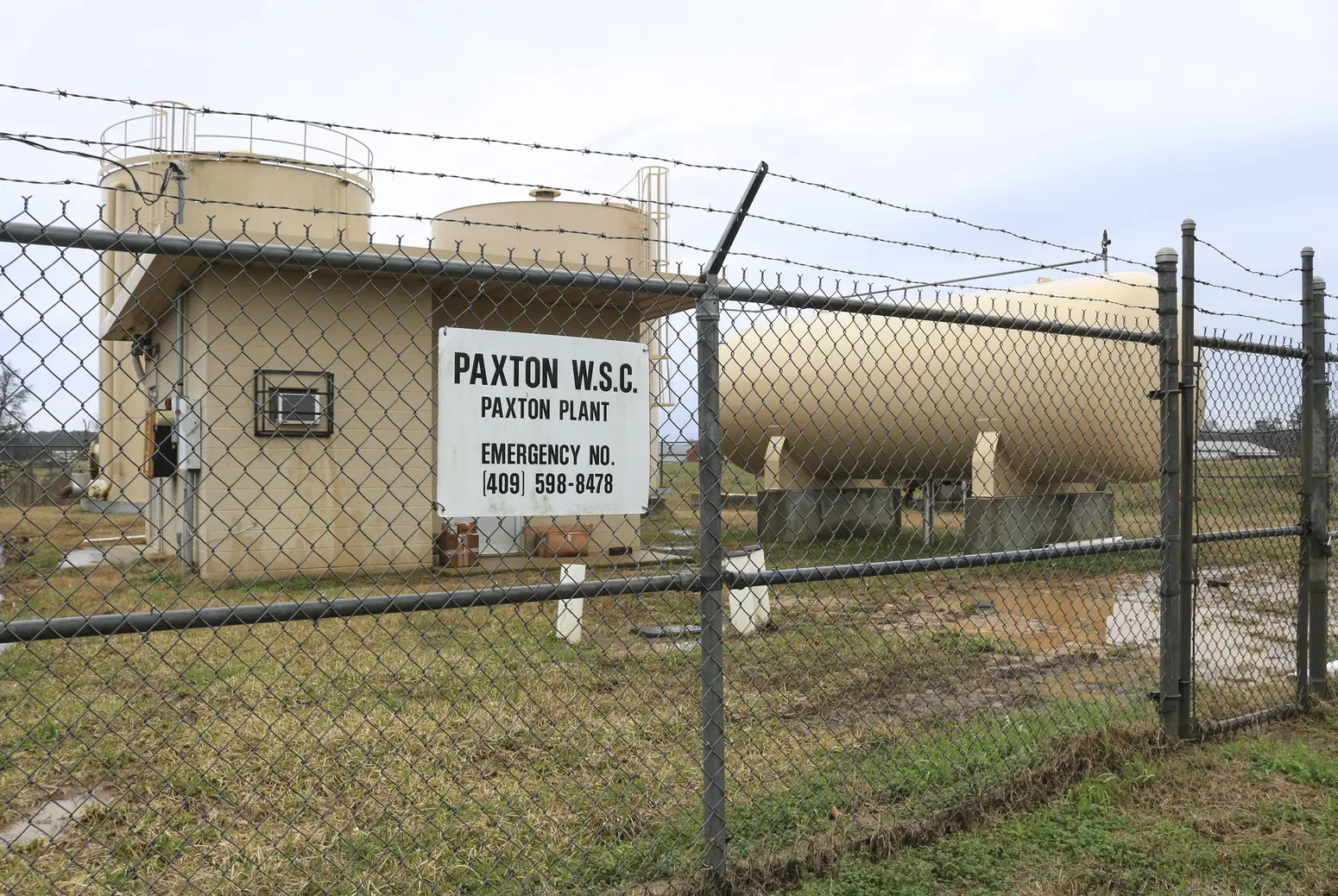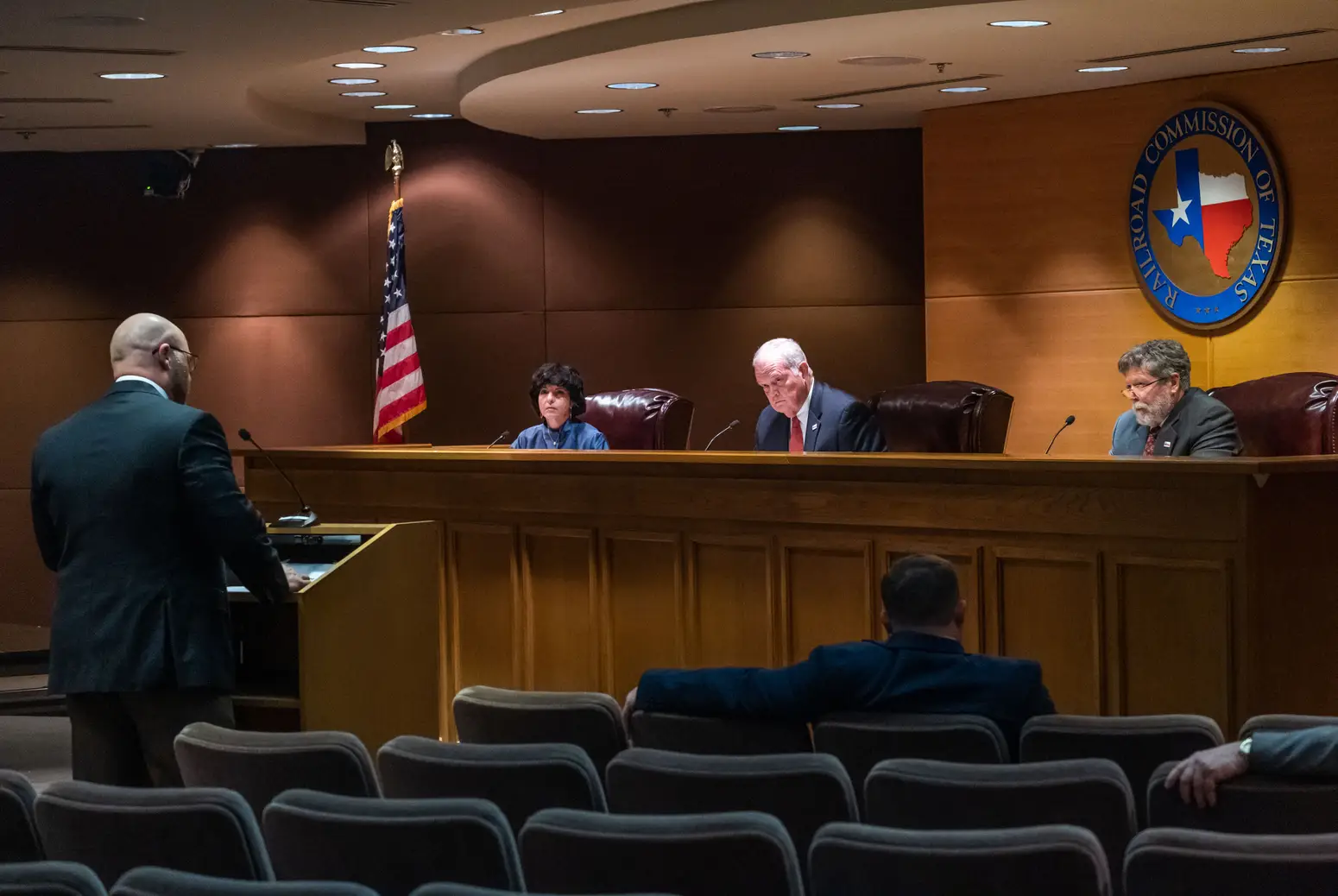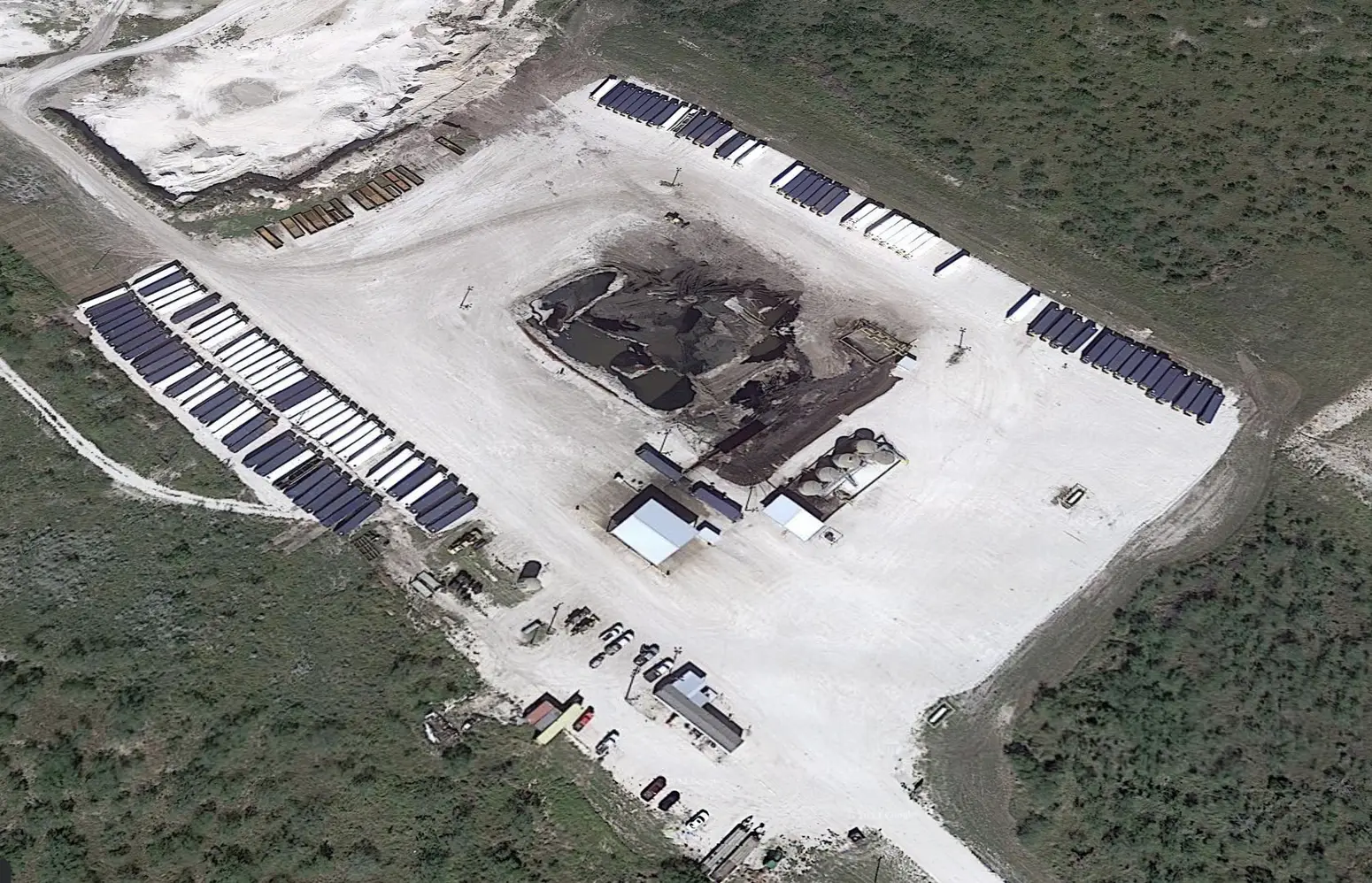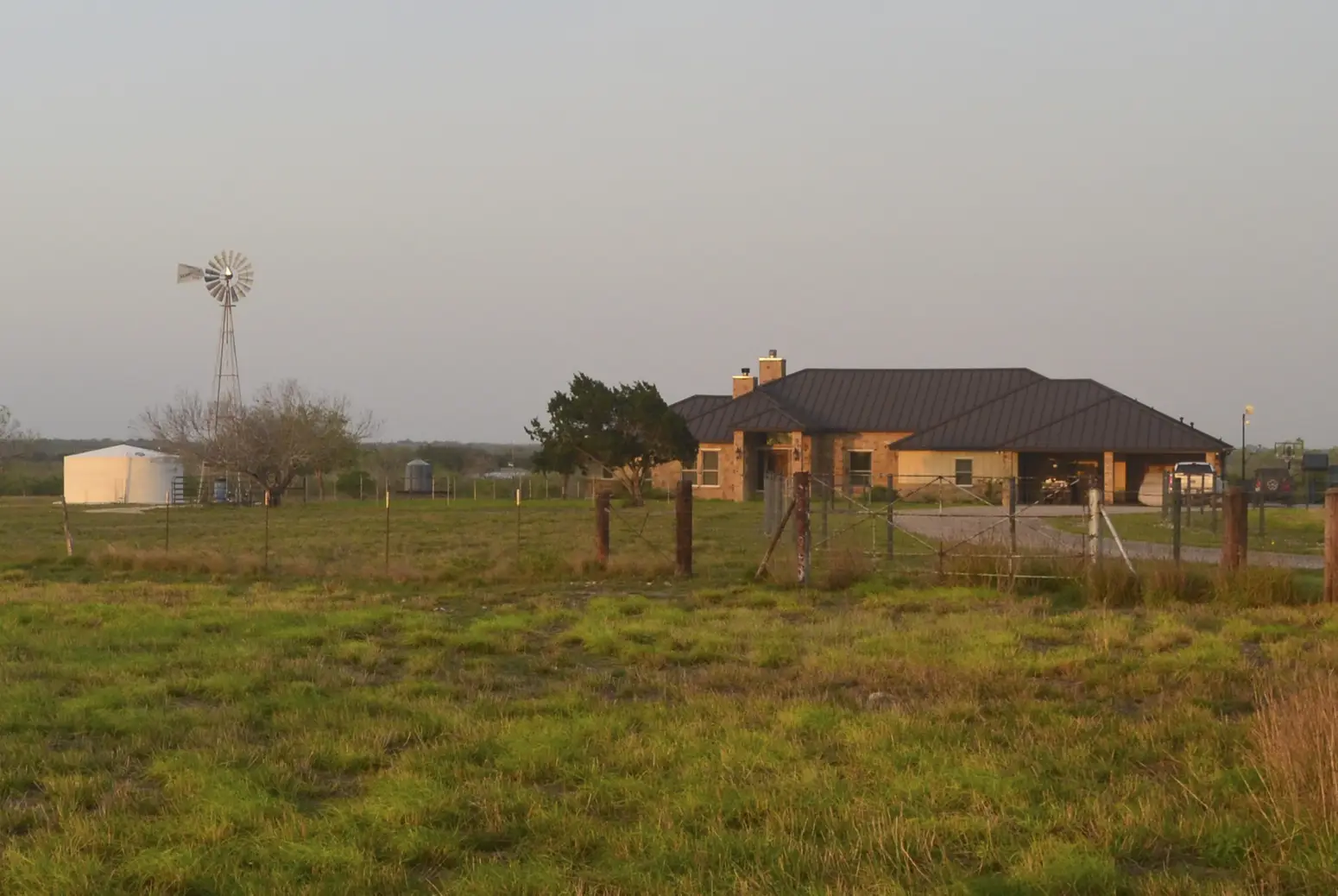By Jason Buch
August 15, 2023
Less than a year after an oilfield waste disposal site opened near Tara Jones’ home in 2019, she and her family noticed a foul odor.
They lived a half-mile away, amid the mesquite trees and pastures west of Corpus Christi. But the sour smell from the Blackhorn Environmental Services site was potent.
Jones would later learn her neighbors had been complaining for months about Blackhorn’s waste pits near the town of Orange Grove, population 1,300. Neighbors later said they sneezed, coughed, got itchy eyes and, on the worst days, felt nauseated.
When the stench reached her house, it became a regular nuisance for Jones, her husband Calvert and their two children — to the degree that she started keeping a written log. She complained to the Railroad Commission of Texas, which regulates the oil, gas and pipeline industries. After one especially bad night, when the odor gave her a headache and made her sick to her stomach, she intensified her efforts. She began filing public records requests with the Railroad Commission and poring over thousands of pages of documents.
In 2021, Blackhorn was found to have violated its permit by receiving industrial waste for which it wasn’t authorized at the Orange Grove site; the company was sued over the issue by the Texas Commission on Environmental Quality, or TCEQ. Blackhorn appealed the permit violation, kept operating and wasn’t fined by the Railroad Commission.
“They [the Railroad Commission] are an entity in existence for the industry and the industry alone, in my opinion,” Jones said.
Jones and her neighbors aren’t the only Texans frustrated with the Railroad Commission, complaining that its policing of waste disposal is weak and doesn’t protect public health. The agency, led by three elected commissioners, has been criticized for years by advocacy groups and some lawmakers who accuse the commission of being too cozy with the industries it regulates.

Two wells of the Paxton Water Supply Corporation, shown here in January 2023, sit about 1,000 yards away from a controversial proposed dump site. Credit: Dylan Baddour/Inside Climate News
The controversy over waste facilities was evident In February, when the commission’s chair, Christi Craddick, was testifying before a state Senate committee about the commission’s budget. State Sen. Robert Nichols, a Republican from Jacksonville in far East Texas, began asking questions about why his constituents were spending tens of thousands of their own dollars to fight an oil and gas waste facility.
Texas has less restrictive rules on waste disposal sites than Louisiana, Nichols said, making disposal facilities near the state line tempting places for oil companies to dump. The proposed facility near Paxton was of particular concern. The residents had raised $50,000 to fight the facility, Nichols said.
“Your staff has rejected … this application from an administrative standpoint because it’s right next to an aquifer, next to the city water supply, next to wetlands, things like that,” he said. “But somehow or another [it] keeps being raised from the dead.”
Craddick told Nichols she couldn’t comment on a matter pending before the commission beyond saying companies whose permits were rejected “have a right to come file” new applications.
McBride Operating LLC had applied in 2019 to develop the waste facility with a drying pad, truck washout pad and landfill half a mile east of Paxton. Community opposition quickly grew intense. Neighbors hired lawyers and a geoscientist to contest the permit and try to poke holes in McBride’s proposal, particularly its assertion that nearby wetlands and the Carrizo-Wilcox Aquifer would be safe from contamination. The fight culminated in a two-week hearing before a Railroad Commission administrative law judge in November 2021. The commission’s staff recommended denying the permit.
At a public commission meeting in December 2022, however, Wright proposed giving the project developers another chance.
“East Texas has certain conditions like shallow groundwater, which makes it difficult to permit a location for the permanent disposal of oil and gas waste,” he said. “The cost for oil and gas waste disposal in East Texas is high, and I don’t want to negatively affect production in the area. However, this need for disposal capacity, dire as it may be, cannot cause the commission to relax its rules and regulations for protection of freshwater.”
He made a motion to send the permit application back to the commission’s hearings division, giving McBride a chance to fix its permit application.
“I myself have constructed safe landfills in similar conditions that handled not just oil and gas waste, but rather industrial hazardous waste,” Wright said. “In other words, it can be done.”
All three commissioners approved the motion. The Railroad Commission held a three-day hearing this spring and hasn’t made a recommendation.
John Hicks, a lawyer for McBride Operating, blamed the drawn-out process in part on the neighbors protesting the site, using the term “NIMBY”, an acronym for “not in my backyard.” He said an inexperienced Railroad Commission staffer wrote the 2021 recommendation to deny the permit, which Hicks called “flawed.” He applauded Wright’s decision to send the application back for another hearing.
McBride “has also had its time and resources burdened in order to disprove the protestants’ arguments,” Hicks wrote in an email. “McBride is also a landowner and is merely seeking to exercise its property rights within the law.”
Linda Wheeler, who lives near Paxton, spent two weeks in Austin at her own expense to protest McBride’s permit application at the 2021 hearing. But she couldn’t leave Paxton to attend the hearing this year because her elderly mother needed care.
“I can’t tell you how many times they’ve given [McBride Operating] a chance to fix this,” she said. “I think they’re wanting us to give up.”

From left, Texas Railroad Commissioner Christi Craddick, agency Chair Wayne Christian and Commissioner Jim Wright listen during a hearing in the William B. Travis Building in Austin. Credit: Dimitri Staszewski for The Texas Tribune
Wright, a South Texas rancher who was elected to the commission in 2020, probably knows the waste disposal business better than other commissioners and most commission staff.
He says his first job at age 19 was at a hazardous waste facility. In the four decades since — he’s 61 — he has gone from employee to owner. According to his public financial disclosures, Wright has ownership in three waste-hauling companies regulated by the Railroad Commission; he’s president of one and director of another.
Yet Wright came onto the commission as somewhat of an outsider. He defeated an industry-backed incumbent in the Republican primary. He has taken positions that suggested he would serve independently of influence from the oil, gas and waste disposal industries. Among the stances were suggesting on the campaign trail that disposal site permits are too quickly granted and promising to recuse himself on matters involving campaign donors.
But environmental advocates question whether Wright can be an impartial regulator. He once paid fines for environmental violations by a company he had owned. He’s softened his promise on potential conflicts of interest, now saying he’ll recuse himself only on matters involving contributors who gave directly before a commission vote. Blackhorn executives and McBride Operating are among the dozens of companies, lobbyists, lawyers and executives with ties to the energy industry that have donated to Wright’s campaign.
Wright isn’t the only commissioner who critics say has conflicts.
Craddick is the scion of a political family that made a fortune in the oil and gas industry and has accepted contributions from people involved in the oil and gas industry, campaign disclosure records show. That includes more than $20,000 from McBride Operating and its owner. Commissioner Wayne Christian, a former legislator, has also received campaign donations from oil and gas interests, including a $100,000 contribution in 2020 from a company whose disposal site he’d voted to approve against the commission staff’s recommendation. Both Craddick and Christian have received donations from Blackhorn executives. A Paxton landowner opposed to the McBride facility gave several hundred dollars to Christian and Wright.
Asked about a report on commissioners’ financial ties to industries, Craddick issued a statement in 2021 saying Texas Ethics Commission laws ensure transparency and “I take these laws seriously.” Christian said during his 2022 race that campaigns are expensive to run but he has never allowed a political contribution to influence his decisions.
Critics of the commission say they’re skeptical Wright can lead a recrafting of Rule 8 regulations to benefit the public good.
“When it comes to the waste industry, he has a personal financial interest in it,” Palacios said. “It’s hard to say if he has strong enough environmental values or strong enough concern for public health that it will outweigh his business interests.”
Krejci, Wright’s spokesperson, said the commissioner owns less than 10% of one of the Railroad Commission-regulated companies listed on his financial disclosures and is not involved in its day-to-day operations. The other two companies also conduct operations regulated by the TCEQ and the federal government, Krejci said.
“As a candidate for office and now as commissioner, I base my decisions on what I believe is best for the state and our citizens,” Wright said in a statement.
The Rule 8 regulations last underwent an overhaul in 1984 and saw minor changes in the 1990s. When Railroad Commission staff last tried to rewrite the rule 20 years ago — commissioners didn’t adopt the changes — they held workshops in five cities and sought public comments. That hasn’t happened this time. Commission Shift has accused Wright of soliciting input only from industry representatives.
Krejci said he expects a draft to be posted on the Railroad Commission’s website by late summer or early fall. An informal public comment period will occur before the proposed rules are submitted to the commissioners. After that, the proposed rule will be published in the Texas Register for a formal comment period before the commissioners vote on whether to adopt it. While an industry task force has provided input, Krejci said the final product will be the work of Railroad Commission staff and the commissioners. He accused Commission Shift of trying “to attach false motives to the commissioner’s stated goals to provide needed updates to Statewide Rule 8.”
“Commissioner Wright anticipates the proposed rule will strengthen protections and provide greater clarity for all parties,” Krejci said.
A recent draft of the new rules has some changes Commission Shift supports, like requiring more wells to monitor groundwater near waste facilities.
“But what we’re not seeing are stronger standards for protecting the public or the environment,” Palacios, the watchdog’s executive director, said.
For example, a recent draft of the proposed rule would codify the Commission’s laissez-faire policy toward fining permit violators, Palacios said.
Louisiana, in contrast, makes it easier to protest permit applications and limits the number of times a company can amend its application, she said.
Among the changes Palacios would like to see in the new rule: increasing public outreach, strengthening enforcement provisions, more rigorous testing of oilfield waste and requiring a more intensive review of permit applications.
In Orange Grove, the odor from Blackhorn’s disposal site caused neighbors to file dozens of complaints with the state in 2019, the year the facility opened.
In late 2019 and early 2020, investigators from the Railroad Commission and the TCEQ paid regular visits to the facility and nearby properties, records from both agencies show. Jones said inspectors told her that air quality was within the TCEQ’s jurisdiction, not the commission’s. In April 2020, the TCEQ issued a notice of violation to Blackhorn for “unpleasant petroleum odors” that interfered with “normal use and enjoyment of animal life, vegetation, or property,” according to a TCEQ environmental investigator’s summary. But the TCEQ didn’t penalize the company.
In 2020, 11 neighbors, excluding the Jones family, sued Blackhorn in a Jim Wells County district court alleging it had failed to notify the Railroad Commission of nearby drinking water wells. The lawsuit also complained of odors that made it “unbearable to be outside and seep into the house,” causing headaches, runny noses and itchy throats, according to affidavits filed in the lawsuit. Even the complainants’ dogs had runny noses.
In August 2020, a TCEQ investigator responding to complaints “immediately felt nauseous [from the odor] and had to leave the area promptly,” according to court filings.
Tara Jones began keeping detailed odor logs in late 2019 at the TCEQ’s request. The following August, she documented 14 hours of rank odors on one day, 18 and a half hours on another.
One night in December 2021 the Jones family again came home to a foul odor. Tara Jones said she rushed her daughters inside, but the stink had permeated the house. She and her family had a metallic taste in their mouths, and she and her husband got headaches, Jones said.
“My headache was so strong, I felt like I was going to throw up,” she said.
Jones decided that keeping odor logs and relying on the diligence of regulators was not enough. She familiarized herself with Blackhorn’s permit and state rules, then began filing requests with the Railroad Commission and the TCEQ for records of waste delivered to the Blackhorn facility, and the tests performed on that waste.
“At that point I was like, ‘If they’re not going to do it, I’m going to do it,” she said.
In April 2021, commissioners voted to renew Blackhorn’s permit, with Wright noting they would keep monitoring the situation.

Built on a former caliche mine, the Blackhorn Environmental Services oil and gas waste disposal facility includes pits to separate solid and liquid material and other pits where waste is dried before it’s dumped in disposal cells. Credit: Source: Google Earth
That same day, Tara Jones emailed a lengthy summary of her findings to the Railroad Commission. She alleged that Blackhorn received waste from unlicensed haulers. Jones also asked why waste, identified as “backwash” and “contaminated bottoms” in the company’s reports to the commission, was being shipped to Blackhorn by a facility owned by Valicor Environmental Services in nearby Robstown. And whether that waste was being tested for toxics, as required.
The following month, the Railroad Commission told Blackhorn it had violated its permit by taking waste from three companies, which Jones had flagged, that weren’t approved oil and gas waste haulers. It also asked for more information about tests conducted on the Valicor waste. In early June, the Railroad Commission notified Blackhorn it had also violated its permit by accepting waste from Valicor, and the permit would be suspended, commission records show. DeSilva, the commission’s communication director, said the investigation of Blackhorn was prompted by a March 2021 inspection of Valicor’s facility.
Since January 2020, the Orange Grove facility had accepted 644 loads of unpermitted waste from Valicor that hadn’t been properly tested for toxics, the Railroad Commission said. The TCEQ later said it tracked 3.8 million gallons and 871 cubic yards of waste from Valicor to the Blackhorn facility.
Blackhorn appealed, denying it had violated its permit. The company was allowed to keep operating pending the commission’s decision on the permit suspension.
In a statement to Public Health Watch, Patricia Canales Bell, Blackhorn’s attorney, wrote that “the Valicor material is non-hazardous and chemically and physically similar to traditional oil and gas waste materials that are managed and processed daily at the Blackhorn facility.”
TCEQ is investigating Valicor’s role in unauthorized waste sent to the Blackhorn facility, according to agency records. Valicor declined to comment.
Four days after commission staff issued the June violation notice, the commissioners voted to deny the Jones family’s appeal of their decision to renew the permit. Wright said Blackhorn would have to provide more information to prove it was in compliance.
“The people of Texas have my word that we will continue to closely monitor this situation,” he said.
In November 2021, the Railroad Commission gave Blackhorn a clean bill of health, ending the permit suspension without issuing a fine. The company had stopped accepting unpermitted waste and taken steps to prevent future violations, commission staff said.
“The RRC’s priority was ensuring the facility was brought into compliance with its permit and that there were no continuing issues,” DeSilva, the commission spokesperson, wrote in an email.
Canales Bell, Blackhorn’s lawyer, wrote in an email to Public Health Watch that the company followed Railroad Commission environmental protection rules. Blackhorn had the waste tested, and the results show “that the Valicor material presents no greater concern or threat to human health or the environment when compared to traditional oil and gas waste generated at the well site,” Canales Bell wrote.
“The Railroad Commission has confirmed that all operations of the Blackhorn facility are in full compliance with every aspect of the issued permit under Statewide Rule 8,” she added.
In early 2022, a judge in Jim Wells County dismissed most of the claims in the lawsuit filed by Blackhorn’s neighbors. A few months later, both sides reached a settlement on the remaining piece of the lawsuit. Neither would share details of the agreement.
Jones and other neighbors were disappointed with the Railroads Commission’s decisions. They still didn’t know what had been making them sick, and Jones said she thought Blackhorn deserved stiffer penalties.
“There’s no incentive to do better,” she said. “You don’t even get a slap on the wrist.”

Months after an oil and gas waste disposal facility opened near the home of Tara Jones and her family near Orange Grove, they started noticing a foul odor that would sometimes make them ill. Jones says it took more than a year of agitating before state regulators took action. Credit: Jason Buch/Public Health Watch
Palacios, of Commission Shift, said a draft of the proposed Rule 8 would allow commission staff to more easily monitor the specific waste that is dropped at disposal sites by letting companies submit their manifests electronically. But electronic reporting wouldn’t be required. If it were and the commission checked the reports, oversight would be more rigorous than the system in place, which relies on private citizens like Jones to review typed or handwritten manifests and reports, Palacios said.
Jones “had to learn how the system functions, then she had to comb through the records line by line when the computer could do this in a split second,” Palacios said.
As the Railroad Commission took steps to end the case against Blackhorn, the TCEQ pressed ahead with its investigation.
During a June 2021 inspection, TCEQ asked for records about Blackhorn’s facility, according to court filings. Blackhorn initially promised to provide the records electronically, but then told inspectors they would have to return to the Orange Grove facility to view them, according to court filings and agency records.
In April 2022, the Texas attorney general sued Blackhorn on behalf of the TCEQ, asking a judge to impose civil penalties for Blackhorn’s accepting waste from Valicor, which the TCEQ regulated, and refusing to provide the records. Blackhorn has argued in court that the TCEQ doesn’t have jurisdiction over the company.
Canales Bell, Blackhorn’s attorney, said the TCEQ’s request for records was voluminous and “overly burdensome.”
The agency never responded to Blackhorn’s invitation to inspect records at the Orange Grove facility, she said.
“Instead, it included this groundless records allegation in its original petition and seeks damages against Blackhorn,” Canales Bell said.
That case is pending. Last year, the Railroad Commission gave Blackhorn permission to receive waste from a Superfund site, but that plan was derailed after the TCEQ intervened.
Tara Jones said that when her neighbors rallied to oppose Blackhorn’s operating permit nearly a decade ago, her family stayed out of it. Her husband works in the oil and gas industry, and they didn’t want to bite the hand that feeds them. When other neighbors sued the company over the odors and water wells issue, the Joneses didn’t join. But she spent enormous amounts of time trying to figure out what was making her family sick— a testament to how miserable they were, she said.
When she heard about the attorney general’s lawsuit, she started crying.
“It was just so much work, and I wasn’t getting any traction from the Railroad Commission,” she said. “It was almost relief that, hey, somebody really is listening, and hopefully we can get it resolved.”
A few months ago, the odor from the waste disposal site returned, although it’s milder than before, Jones said. She has started keeping an odor log again.